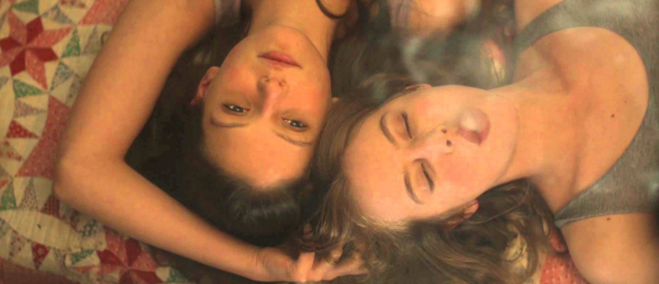There is perhaps no more complex relationship in existence than the one that is between two adolescent females. It is a time in one’s life of extreme confusion and susceptibility to influence. In actress Mélanie Laurent’s Respire, or Breathe as it is called in English, this fact is painfully and beautifully displayed by Charlie (Joséphine Japy), a seventeen-year-old who learns at first merely in theory what it means to let passion overtake you, only to forget all of her logic upon meeting Sarah (Lou de Laâge), an overly sophisticated new student with a background shrouded in alleged foreign travel, chiefly to Nigeria, where her mother is working for an NGO. So taken in with Sarah’s confidence and seemingly precocious ways that Charlie ignores all of her subtle flaws and casts aside her most loyal best friend, Victoire (Roxane Duran), to spend more time with, what appears to her, a force of nature.
As a lesson in Charlie’s class pertains to the perils of passion, her teacher asks, “Do you think passion is a means or obstacle to freedom? When you’re passionate, are you more free or less free?” One of Charlie’s fellow students and ex-boyfriend, Lucas (Louka Meliava), insists, “We don’t choose passion, we feel it. We feel those emotions against our will.” Charlie counters, “Nietzsche says it’s easier to renounce passion than control it. Meaning we become so preoccupied by it that we lose a kind of freedom.” Their teacher concludes, “Exactly, it’s the notion of excess. Passion is harmful when it becomes excessive, which is most of the time.”
And yet, Charlie loses all abandon when it comes to Sarah, who talks her into bringing her on a weekend vacation for All Saints’ Day with her and her mother, Vanessa (Isabelle Carré), recently reeling from her physically violent husband and their separation. When Charlie introduces Sarah to the guy she has a crush on as a “classmate,” it completely disorients and angers Sarah, who, from this moment forward acts in an erratic manner toward Charlie, ultimately using everything she ever said in confidence–including her father’s abusive nature–against her in a smear campaign that turns most of the school against her. Charlie’s issues with asthma–an obvious allusion to the film’s title–intensify as her anxiety does, particularly during P.E., when she runs ahead of Sarah after she gets pushed by her and then ends up having an attack.
Charlie’s obsession with Sarah and figuring out why her emotions have ceased in their intensity manifests in her following Sarah home, where she discovers that she’s been lying the entire time–that the so-called “aunt” she’s been staying with is really, in fact, her alcoholic mother. Suddenly “understanding” why Sarah is the way she is, she uses her secret as a reason to justify her manipulative behavior, and even tells Sarah what she knows at a New Year’s Eve party only to be threatened with death if she ever tells anyone about it.
The increasing gulf between Charlie and Sarah begins to affect her performance in school, and even her interactions with friends who still care about her, particularly Lucas. But Charlie’s more than semi-lesbianic obsession with Sarah has consumed her so fully that nothing else matters, just as Nietzsche warned her. Finally, the only logical conclusion occurs: during which Charlie makes the transition from fanatical love to extreme hate, delivering a denouement that makes one question where the line between being pushed to the edge and already brimming with insanity begins and ends–not to mention showcases the final grand reference to the name of the movie.





















